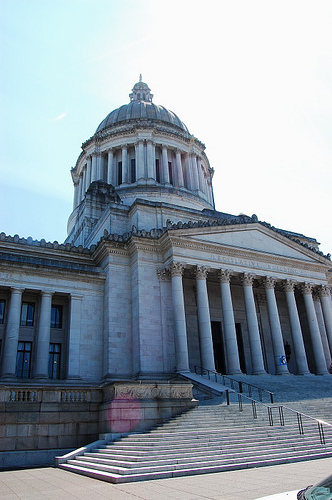The Washington Supreme Court has thrown out as unconstitutional the viciously antidemocratic, reflexively right-wing, school-and-public-services-impoverishing supermajority voting requirement that has tied Washington representatives’ hands, on and off, for the last two decades. This win is so important that northwesterners, even those in neighboring jurisdictions, should be dancing in the streets.
The ruling changes the long-term outlook for everything: state budgets, tax reform, climate policy, tax loopholes for fossil fuel companies, and more. Though politics may temper the ruling’s impacts in the short run, the long view looks newly bright. This is a turning point.
As Goldy reminds us at the Stranger, while the state supreme court “invalidated Washington’s two-thirds supermajority requirement by only a 6-3 margin, it is important to note that there was only one justice who dissented on the merits of the underlying issue.”
Tim Eyman’s undemocratic, unconstitutional, unfair, oil-industry Trojan Horse supermajority rule imposed government by minority faction on the state legislature for closing tax loopholes and raising new revenue. It was the single biggest legal barrier to progress in Washington on issues ranging from climate to education.
Democracy’s most fundamental principle is majority rule. The supermajority rule violated this principle, giving a veto to a minority of just one-third (plus one) of the members of either the state House or senate. Should one-third of just one house be able to veto the elimination of tax loopholes that shower public resources on coal plants, bull semen, laser interferometer gravitational wave observatories, and dozens of other business and commercial activities? Should one-third of either house be able to prevent collection of the revenue needed to fulfill the state’s constitutionally mandated “paramount duty” to fund your community’s schools?
Eyman’s brand of minority rule meant that just 17 members of the Washington Senate held veto power over closing tax loopholes and raising revenue. Who were those 17? The 17 most conservative members—the minority most opposed to closing loopholes and raising revenue. (For political junkies, I included a list at the end of this old post. The list is now out of date; fortunately, it’s also now moot!)
These now-deposed 17 were not simply a few degrees right of center on the state’s political continuum. They were a distinct ideological minority, polarized away from the governing coalition in Olympia and radically to the right of their peers. All white, mostly male, and mostly from outlying places like Ritzville and Moses Lake, they were also mostly Republican. Judging from their voting records, they were twice as conservative as the typical member of the state senate.
And supermajority voting had put them in charge. That’s what minority rule looked like. Thanks to the Supreme Court, it’s over.
The court’s decision restores the Washington legislature to majority rule and makes many good things more possible: Some of them are much in the news, such as adequate funding for public education, as required by recent state supreme court decisions. Other, less-known reforms would also enter the realm of possibility: an oil fee to support Puget Sound clean-up, closing a tax loophole for oil refiners, perhaps even a revenue-neutral carbon tax shift as in British Columbia, or a cap-and-trade system as in California.
Progress on any of these fronts will still take a long struggle to win a majority of votes in the legislature, but when it comes, it will give courage to British Columbia and Oregon to move forward too. This Supreme Court ruling is a victory for all of Cascadia.
Oh, and permit me a moment of gloating: I was 100 percent right about the votes when I wrote about the oral arguments on the case back in September. At the time, I counted six votes to overturn the law as unconstitutional, and I correctly anticipated how each member of the court would vote. Not bad for a novice court watcher.


Comments are closed.